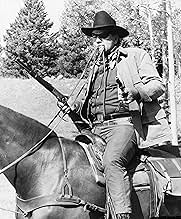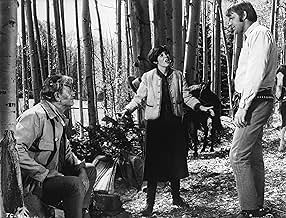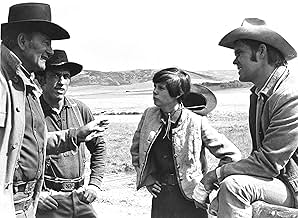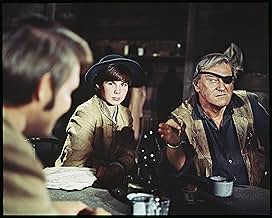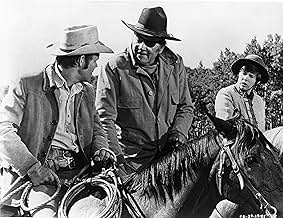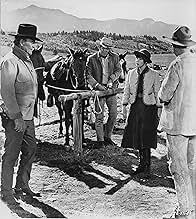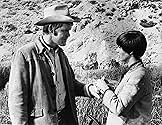Un duro Maresciallo degli Stati Uniti e un Texas Ranger aiutano un'adolescente testarda a rintracciare l'assassino di suo padre nel territorio indiano.Un duro Maresciallo degli Stati Uniti e un Texas Ranger aiutano un'adolescente testarda a rintracciare l'assassino di suo padre nel territorio indiano.Un duro Maresciallo degli Stati Uniti e un Texas Ranger aiutano un'adolescente testarda a rintracciare l'assassino di suo padre nel territorio indiano.
- Regia
- Sceneggiatura
- Star
- Vincitore di 1 Oscar
- 6 vittorie e 7 candidature totali
Recensioni in evidenza
A few directors in the past have tried to present the West in a more refined way, giving importance to the settings and the characterization. Among them is Henry Hathaway's True Grit, an emotionally charged Western about a fearless; one-eyed Marshall named Rooster Cogburn.
The film very stylishly brings to fore the Western countryside, from the scenario at a public hanging to the courtroom drama. In the latter we see some tense and heated exchange of words between the prosecuting lawyer and the Marshall.
The intriguing plot unfolds itself very nicely on the silver screen. The story is simple. Tom Cheney, a cowboy, kills his employer. Maddie (Kim Darby), the headstrong daughter of the employer, vows to take revenge and get Cheney hanged for the murder of her father. For the mission she enlists the support of one Rooster Cogburn (John Wayne). Now this Rooster is the meanest Marshall in the entire territory. Having lost one of his eyes in the war, he is totally fearless in disposition, talks brazenly and has an unconventional sense of humor. Despite his hardened exterior, he is warm and benevolent at heart. This is evident in the conversations between him and Maddie.
The third angle to the mission comes in the form of Sgt Lebeof (Glen Campbell), an enthusiastic Texas Ranger, who is after Cheney for his own motive of collecting ransom money. At first instance, Maddie has reservations about Lebeof. He comes across as an ill mannered, uncivilized guy to her. Convinced that Maddie will not make him a party to the pursuit of Cheney, Lebeof, secretively, unknowing from her, teams up with Rooster. He takes Rooster into confidence and through him manages an entry into the chase for Cheney.
The character of Lebeof is an interesting study. He comes across as an inexperienced person who has a knack for saying something silly all the times. He is rebuked many times for such uttering by both Maddie and Rooster.
Rooster had his own reasons for going after Cheney. It so happened that this Cheney was an accomplice of Lucky' Ned Pepper (Robert Duvall) and Rooster had some unfinished business with Ned. He recently had shot Ned in the lower lip during a confrontation but Ned had escaped. Now this chase provided Rooster with another shot at Ned.
The chase is beautifully picturized. Especially the final confrontation between Ned's gang and Rooster. The action sequence in this scene must be seen to be believed.
The reverberating and sweet music score by Elmer Bernstein forms an integral part of the plot. Glen Campbell has rendered the opening title song in his trademark voice. True Grit is a treat to watch for its believable depiction of the life and times of the West. Henry Hathaway, a specialist director of the crime, western and thriller genre has masterfully directed this flick. Re-uniting with Wayne after Sons of Katie Elder (1965), he has managed to extract the very best from his leading man. John Wayne has essayed the role of his lifetime. It is impossible to imagine anybody but him in the lead role as a tough, uncouth and drunken Marshall. Interestingly, Wayne won his only Oscar for this role in 1970.
John Wayne's parting comment in this film is directed as much at us the viewers as it is at the young woman his Rooster Cogburn character is addressing. In a way, Wayne throughout the film plays off the image he cemented in dozens of great and near-great westerns, with a nod that by 1969, he along with the western genre had fallen behind the times, that his shoot-first approach to law and order had worn thin with the critical establishment just as it does in Judge Parker's courtroom.
In that way, playing a character of such dogged homicidal cussedness as the hard-drinking, one-eyed ex-Quantrill Raider Rooster Cogburn and giving him a teenaged girl seeking justice to play off so as to showcase his essential decency seems a clever means to win Wayne an Oscar, which he finally did here, a sentimental triumph over some more heralded performances. With such an attitude, you might think "True Grit" would come off a bit of a one-trick pony 37 years on. But it doesn't. In many ways, both the film and Wayne's performance come off better than ever.
Helping matters a lot is the support Wayne receives from two women. As the heroine, Matty Ross, Kim Darby provides Wayne with a fantastic foil, doughty to the point of rudeness, forever finding fault in others but earning your good will through her simple faith in justice and loyalty to the memory of her slain father, for whom she wants Rooster's help avenging. As she is told by a horse dealer she banters with: "I admire your sand."
The other is Marguerite Roberts, whose adaptation of Charles Portis' novel bristles with good humor and an ear for the period. "If ever I meet one of you Texas waddies who ain't drunk water from a hoofprint, I think I'll... I'll shake their hand or buy 'em a Daniel Webster cee-gar," Rooster tells his braggart riding companion, a young Texas Ranger played by country singer and ex-Beach Boy Glen Campbell.
Campbell may be a novice and a third wheel in the interplay between Wayne and Darby, but he acquits himself well and delivers a worthy performance in a cast stacked with talented actors like Robert Duvall, Jeremy Slate, and Strother Martin, not to mention Dennis Hopper, hiding the long hair he made famous in "Easy Rider" that same year. Some of these actors portray bad guys, but Roberts' script and director Henry Hathaway's languid pacing allow them to present some humanizing qualities that go a long way toward making "True Grit" more than your typical shoot-em-up oater.
Even Jeff Corey, who plays a no-account named Chaney who shot Matty's father, has a funny scene when he tells Matty how to cock her pistol, then whines after she shoots him with it: "Everything happens to me!"
About the only fault I can find with the film is Elmer Bernstein's bombastic score, which employs overly ornate orchestration like kettledrums when Matty has her showdown with Chaney and is tuneless apart from the title song, which is Campbell's best moment here. Hathaway's direction is somewhat pedestrian but serves the script, and showcases some incredible autumnal vistas of tall birch and pine where Rooster and Matty search for Chaney, photographed by Lucien Ballard in a style akin to (but more dreamy than) his work on the same year's "The Wild Bunch."
1969 was the last great year for westerns, with this, "The Wild Bunch," "Butch Cassidy And The Sundance Kid," "Support Your Local Sheriff" and "Once Upon A Time In the West," and its interesting how Ballard, Corey, and Strother Martin turned up in more than one of them. But good westerns never really go out of style, they just sit on the shelf awhile like an old Stetson waiting to be rediscovered. Nobody wore a Stetson better, or deserved an Oscar more, than John Wayne. "True Grit" does the double duty of showing why he was a star and further burnishing his luster.
However, the film does look great. Handsomely shot with great scenery, True Grit is pleasing to the eye. Elmer Bernstein's score is rousing and very fitting, while the story is interesting, most of the characters are credible and the script flows well. Also True Grit is very well directed, and there is a glorious final shoot-out. Other than Campbell and Darby, the other acting is fine. While I would have not personally given the Oscar to this particular performance(I thought he was better in The Searchers, Red River and The Quiet Man) John Wayne is excellent here, and while he doesn't appear until quite later on Robert Duvall also makes a positive impression.
All in all, a very good film but could have been better in my view. 7/10 Bethany Cox
Why this film hasn't had more votes and a higher rating in imdb is a complete mystery to me. I'm English, and I always thought the Americans really loved their westerns and John Wayne in particular. Can anyone explain please?
Lo sapevi?
- QuizStunt double Jim Burk performed the entire scene where Rooster Cogburn charged Ned Pepper's gang on horseback. John Wayne was only seen briefly in close-up, and he was riding on a trailer, not a horse.
- BlooperRooster reports Lucky Ned Pepper had robbed the KATY Flyer, a train that did not start running until 1896, long after the time in which the story is set.
- Citazioni
[Rooster confronts the four outlaws across the field]
Ned Pepper: What's your intention? Do you think one on four is a dogfall?
Rooster Cogburn: I mean to kill you in one minute, Ned. Or see you hanged in Fort Smith at Judge Parker's convenience. Which'll it be?
Ned Pepper: I call that bold talk for a one-eyed fat man.
Rooster Cogburn: Fill your hand, you son of a bitch!
- Versioni alternativeWhen submitted for a rating from the MPAA in 1969, the film was given an "M". The film was edited and rerated "G". The American VHS version contains the "G" rated cut while the DVD is the uncut "M" version (which would be printed as "PG" since the symbol was changed in the 1970s).
- ConnessioniEdited into The Kid Stays in the Picture (2002)
I più visti
- How long is True Grit?Powered by Alexa
Dettagli
- Data di uscita
- Paese di origine
- Sito ufficiale
- Lingua
- Celebre anche come
- Temple de acero
- Luoghi delle riprese
- Azienda produttrice
- Vedi altri crediti dell’azienda su IMDbPro
Botteghino
- Lordo Stati Uniti e Canada
- 276.418 USD
- Fine settimana di apertura Stati Uniti e Canada
- 157.788 USD
- 5 mag 2019
- Lordo in tutto il mondo
- 276.418 USD
Contribuisci a questa pagina



